Wife of Union General George Armstrong Custer Libby Bacon met George Armstrong Custer at a Thanksgiving social in 1862, while he was visiting Monroe, Michigan on leave during the Civil War. She fell deeply in love with him, but her father refused to allow them to get married. Custer was from a poor undistinguished family and the Judge hoped Libby would have a better life than that of an army wife. Elizabeth “Libby” Clift Bacon was born at Monroe, Michigan, April 8, 1842 – the only surviving child of Judge Daniel and Eleanor Sophia Bacon. At twenty, Libby graduated as valedictorian from the Young Ladies’ Seminary and Collegiate Institute in Monroe. At 5′ 4″ tall with chestnut brown hair and…

Slavery on Long Island
African Slaves on Long Island, New York In 1626, a ship carrying 11 male slaves sailed into the harbor at New Amsterdam. They were immediately put to work by the Dutch West India Company building roads, cutting timber, clearing land and helping construct a major fort at the southern tip of Manhattan. For the next 38 years – until the British took over New Netherlands and renamed it New York – the Dutch slowly increased the numbers of slaves in the colony, including the settlements on western Long Island. Some slaves were imported directly from Africa, but the Dutch officials preferred to buy slaves who had been “seasoned” by a few years of living in the West Indies. By then…

Abigail Ellsworth
Wife of Founding Father: Oliver Ellsworth Oliver and Abigail Ellsworth Abigail Wolcott was born February 8, 1755, in East Windsor, Connecticut, the fifth of seven children born to William and Abigail Abbott Wolcott. Oliver Ellsworth, the second son of Captain David and Jemima Leavitt Ellsworth, was born in Windsor April 29, 1745. At 17 Oliver went to Yale to study the ministry, but was expelled for playing pranks. Ellsworth graduated from the College of New Jersey in 1766 and began the study of law. Returning to his home in Windsor, Connecticut, Oliver studied theology and then law, and was admitted to the bar in 1771. At first his law practice was so poor that he had to support himself by…
Kitty Morgan Hill
Wife of Confederate General Ambrose Powell Hill One of the greatest love stories of the Civil War was that of Confederate General A.P. Hill and his wife Kitty. They met during the social season in Washington, DC a few years before the war and fell instantly in love. Their marriage was one of commitment and devotion from beginning to end. During the war, Kitty remained as close to Hill as possible, which caused him great anxiety for her safety. The Parting by John Paul Strain Not even the biting cold of a Virginia winter could cool the affection shared by General A.P. Hill and his wife Kitty Morgan Hill. Kitty Morgan was born in Lexington, Kentucky in 1834, one of…
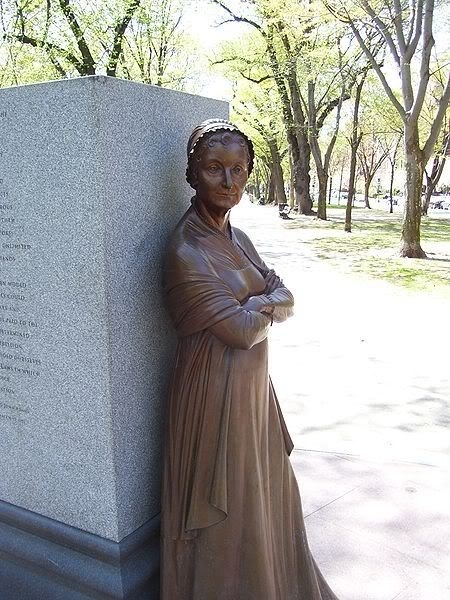
Daughters of Liberty
Women Who Sacrificed Comfort for Independence The Daughters of Liberty displayed their loyalty by supporting the nonimportation of British goods during the American Revolution. They refused to drink British tea and used their skills to weave yarn and wool into cloth, which made America less dependent on British textiles. The most zealous Daughters refused to receive gentleman callers who were not sympathetic to the patriot cause. Image: Abigail Adams Monument Boston Women’s Memorial It is not in the still calm of life that great characters are formed. The habits of a vigorous mind are formed in contending with difficulties. Great necessities call out great virtues. ~ Abigail Adams The Revolutionary War brought women into many new causes. Although women’s organizations…
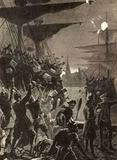
Sarah Bradlee Fulton
Wife and Sister of American Patriots Image: The Boston Tea Party Sarah Bradlee was born on December 24, 1740, in Dorchester, Massachusetts – Boston’s largest and most populous neighborhood. On July 25, 1762, Sarah married John Fulton, and they moved to Medford, Massachusetts. The couple often visited Sarah’s brother, Nathaniel Bradlee, in Boston. Nathaniel’s support of American independence was well known. His carpenter shop and his kitchen – where friends and neighbors gathered to enjoy his codfish suppers – were meeting places for Boston’s most devoted patriots. Medford was also the site of some patriotic fervor in the years leading up to the American Revolution. A resolution opposing the Stamp Act was passed by the town of Medford in 1765….
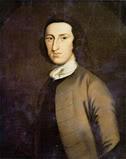
Susannah French Livingston
Wife of Patriot: William Livingston Image: William Livingston Delegate to the Continental Congress William Livingston was born in 1723 at Albany, NY, son of Philip and Catharine (Van Brugh) Livingston. His mother was the daughter of the Dutch mayor of Albany Pieter Van Brugh. His paternal grandfather, Robert Livingston, had emigrated to American in 1673, and received grants to Livingston Manor – a large tract of land on the Hudson River. William spent his childhood there under the indulgent care of his maternal grandmother Sarah Van Brugh. At the age of fourteen, William lived for a year with a missionary among the Mohawk Indians in the wilds of New York’s Mohawk Valley, an experience which his family felt would be…
Isabella Morrison Hill
Wife of Confederate General Daniel Harvey Hill Isabella Morrison was the daughter of a Presbyterian minister, Reverend Doctor Robert Hall Morrison, who was the first president of Davidson College near Charlotte, North Carolina. She was also the granddaughter of General Joseph Graham, who had seen extensive service in the Revolutionary War, including the Battle of Charlotte, and the Battle of Cowan’s Ford on the Catawba River. Image: General Daniel Harvey Hill An intelligent woman, Isabella had met Daniel Harvey Hill while he was visiting one of his married sisters, who lived near Cottage Home, the residence of the Morrisons in Lincoln County, North Carolina. Born in York District, South Carolina, “Harvey” had graduated from West Point in 1842, and subsequently…
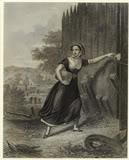
Women Spies of the Revolution
Females Gathered Intelligence for the Patriot Cause During the Revolutionary War, both the British and American armies recruited women as cooks and maids. With their almost unrestricted access, these women could eavesdrop on conversations in soldiers’ campsites and provide the critical intelligence they gathered to military and civilian leaders. Some reported directly to General George Washington, who came to highly value the information he received from these “agents in place.” Spying on the Enemy As their husbands, sons, brothers, fathers and uncles took up arms, these women served as the eyes and ears for military leaders, providing invaluable intelligence information throughout the war. Allied with either the British loyalist or American patriot cause, spy networks sprang up throughout the colonies.
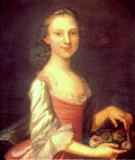
Mary Digges Lee
First Lady of Maryland Mary Digges was born in Maryland in 1745, on her family’s estate, Mellwood Park, the daughter of Ignatius and Elizabeth Parnham Craycroft Digges, prominent landowners in Prince George’s County, Maryland. The family home received such distinguished guests as George Washington. The future President would visit Mary’s father, Ignatius Digges, for a brief rest from his travels around the colonies. Image: Mary Digges Lee Portrait by John Wollaston The Digges were Roman Catholic, and Ignatius consented to the marriage only after Thomas, an Anglican, wrote a series of heartfelt letters during the summer of 1771 giving his assurance that he would convert and that all their children would be raised Catholic.